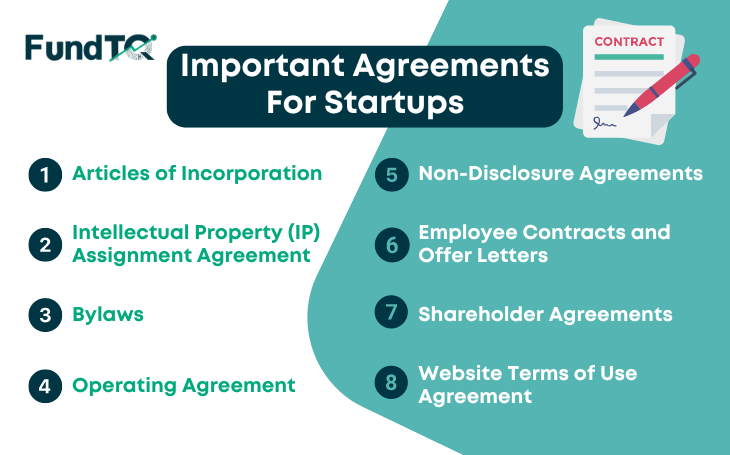Establishing a business is a thrilling adventure full of aspirations for expansion and success. However, amidst the excitement, it’s crucial for entrepreneurs to establish a solid legal framework to avoid potential pitfalls down the road. In this guide, we’ll explore seven critical legal agreements for every startups that should be prioritized to prevent costly legal battles in the future.
Contracts for Startups
Following are the important agreements for startups:

1. Articles Of Incorporation
Often overlooked by eager entrepreneurs, the Articles of Incorporation lay the groundwork for a company’s organizational structure. Choosing the right business entity, such as a C corporation or a limited liability company (LLC), is essential. The decision impacts personal liability, taxes, and overall financial burden. Taking the time to weigh the pros and cons ensures a strong foundation and guards against personal liability risks.
2. Intellectual Property (IP) Assignment Agreement
In the tech-driven landscape, startups must safeguard their intellectual property (IP) to secure development finance. An IP Assignment Agreement is instrumental in establishing ownership of all IP assets, protecting against patent trolls and imitators. Two key contracts, Technology Assignment Agreements and Invention Assignment Agreements, enable startups to acquire pre-existing IP and gain legal rights to works developed post-founding, respectively.
3. Bylaws
Establishing robust rules early on is crucial for the effective operation of a startup. Bylaws outline internal processes, dispute resolution mechanisms, and shareholder obligations. Importantly, they set minimum support levels for significant corporate activities, such as electing board members or taking on debt.
4. Operating Agreement (Founder’s Agreement)
To prevent future conflicts, founders should sign a comprehensive operating agreement outlining ownership of work and establishing communication and conflict resolution procedures. This agreement solidifies the relationship between founders and ensures clarity on each member’s contributions and responsibilities.
5. Non-Disclosure Agreements (NDAs)
Protecting sensitive information is paramount, especially when dealing with third parties. NDAs are essential before engaging in any commercial transactions, ensuring confidentiality regarding closely guarded secrets. The agreement should address when information is classified as confidential, the care taken with it, decision-making authority, the duration of confidentiality, and the maintenance of secrecy.
6. Employee Contracts And Offer Letters
Drafting detailed employment contracts and offer letters is crucial before hiring employees. These documents clarify employment terms, roles and responsibilities, intellectual property rights, and company policies. Clear communication through written materials ensures compliance with legal duties and sets expectations for both parties.
7. Shareholder Agreements
When seeking private financing, a well-drafted shareholder agreement is essential. It defines shareholder rights, governance, the right of first refusal, redemption in case of death or incapacity, and the right to transfer shares. Founders selling shares must comply with state and federal laws to avoid severe fines.
Bonus
Website Terms of Use Agreement
As startups expand their online presence, a well-crafted Website Terms of Use Agreement becomes indispensable. This agreement regulates the relationship between the company and its clients, covering issues such as website usage restrictions, disclaimers, liability limitations, privacy policy disclosures, copyright warnings, and dispute resolution jurisdiction.
Conclusion
Establishing a startup is an exciting venture, but neglecting the legal foundation can lead to unforeseen challenges. Entrepreneurs must recognize the importance of seeking legal counsel to avoid potential pitfalls. While budget constraints may be a concern, hiring a qualified attorney is an investment that pays off in the long run.
Clear and comprehensive legal agreements not only protect the company but also make it more attractive to investors. A systematic and organized approach to legal matters demonstrates a commitment to professionalism, reducing the risk of legal challenges and allowing the company to focus on growth and development. As the saying goes, “an ounce of prevention is worth a pound of cure,” and in the startup world, these legal agreements are the preventive measures that pave the way for success.
Also Read: Investment Memorandum Guide



